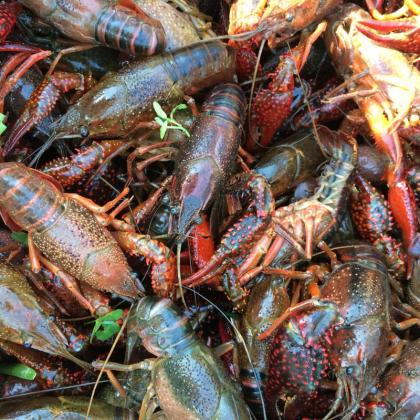
Jim Bradshaw
I have contended for years that folks who fast during Lent in south Louisiana should be forced to give up seafood, not meat. I think it is a legitimate question of just how much sacrifice is involved in eating crawfish étouffée instead of fried chicken, or crabmeat-stuffed flounder instead of pork chops.
So, it came as no surprise when I recently ran across a scholarly study showing that Lent has had a lot to do not only with how we eat, but how well we eat. The scholars say some of our finest seafood dishes were developed because of the custom of fasting during Lent.
As you know, Church law requires abstinence from meat on Fridays in Lent and some other days for everyone over 14 years old, unless there are special circumstances. According to that law, “meat comes only from animals such as chickens, cows, sheep or pigs — all of which live on land. Birds are also considered meat. … Fish are a different category of animal. Salt and freshwater species of fish, amphibians, reptiles … and shellfish are permitted.”
Things made from meat, such as broth or gravies are also taboo, but the rule allows us to eat crawfish, shrimp, oysters, crabs, frogs, turtles, and even alligator, to which Archbishop Gregory Aymond of New Orleans gave his blessing because it is “considered in the fish family.” and so can be eaten. Where else but Louisiana would such a ruling be required?
Nowadays, of course, only Fridays and a few others are Lenten fast days. Scholars Mackie J.V. Blanton and Gayle K. Nolan note that before Vatican II changed things in the early 1960s, meat was ruled out at every meal during Lent except on Sundays. Their observations are in an essay in a book published at the time of the bicentennial of the Archdiocese of New Orleans (Glenn Conrad, Cross, Crozier, and Crucible, Lafayette: Center for Louisiana Studies, 1993).
They say that “with the arrival of the first wave of Acadians … a new twist was added (to Lenten meals in Louisiana). The Cajuns brought with them the custom of using turtle, one species of duck, and even poule-d’eau, on meatless days.”
Further, they say, “The combination of French, Creole, Cajun, and African-American cuisine and ingenuity in utilizing the abundant seafood of the area produced several styles of cooking that are (still) widely practiced. The French learned to make shrimp and crab gumbo, as well as oyster stews, soups, patties, and even oyster pie. They stuffed eggplant and squash with shrimp, concocted eggs with black sauce, boiled fish for salads, and stuffed fish of every variety with shrimp, crabs, and seasoned bread.
“Turtle soup, jambalaya, and fish courtbouillon with its tangy gravy continue to draw visitors … even today,” according to the authors. “but few visitors realize the debt that Louisiana owes to an earlier … Lenten season of forty long meatless days.”
Some of our traditions may even bend the rules a little bit. For example, many of us start taking an active interest in the price of crawfish as the end of Lent draws near, so that we will know how much to assess each cousin for the fixin’s for the traditional Good Friday crawfish boil.
Good Friday is one of two days (Ash Wednesday is the other) in the Catholic calendar when Catholics are supposed to reduce the amount of food they eat to one full meal, and two smaller meals. A crawfish boil fits into that rationale exactly, according to one of my cousins, because it constitutes just one meal — even if it goes on all day.
Also, counter-intuitively, the regulations say drinking milk (which comes from animals) will break your fast, but alcoholic beverages (which come from grapes or grain) do not. Thus, it’s OK to drink a cold beer or two with the crawfish.
Here’s my suggestion: If we must “sacrifice” and eat seafood in south Louisiana, the law should be changed so that the food cannot be prepared by anyone with even a drop of Cajun or Creole blood or anyone who has lived here for more than six months, that it may not be cooked in a black iron pot, and that it must be prepared according to a recipe concocted by some fast-food chain that has no outlets south of Atlanta.
That, at least, offers the possibility of penance.
A collection of Jim Bradshaw’s columns, Cajuns and Other Characters, is now available from Pelican Publishing. You can contact him at jimbradshaw4321@gmail.com or P.O. Box 1121, Washington LA 70589.
